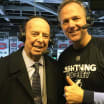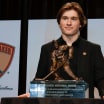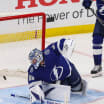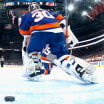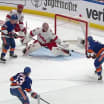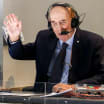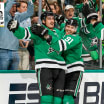Emile "The Cat" Francis had traveled much of North America in his career as a professional goaltender. His minor league stops included Philadelphia, Washington and Cleveland, among others. He also had stints with the Chicago Blackhawks and New York Rangers in the NHL.
When Francis became general manager of the Rangers in 1964, he figured his days as a goaltender had ended. And, in fact, they had, until a strange set of circumstances compelled the 42-year-old to sign another NHL contract -- one that was worth exactly $1.
Blizzard turned Rangers GM Francis into backup goaltender
Signed $1 contract after snowstorm left New York shorthanded for game vs. Flyers
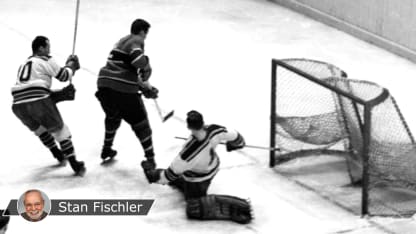
By
Stan Fischler
Special to NHL.com
It was all because of one of New York's most furious blizzards. Even Francis' players said they had never seen anything like it -- the Nor'easter nor their boss' $1 signing.
"It was the worst snowstorm I've ever seen," defenseman Arnie Brown said.
"I never saw a snowstorm like that one," said forward Dave Balon, who grew up in real snow country -- Wakaw, Saskatchewan.
The blizzard that nearly revived Francis' goaltending career began harmlessly enough on Feb. 9, 1969, with a light snow falling over the New York metropolitan area. But the dusting soon turned into a serious snowfall and when the winds picked up it became an authentic, stop-the-presses storm.
Francis was unconcerned initially, but soon realized that the snow could have an impact on the game scheduled for that night; the Rangers were slated to play the Philadelphia Flyers, who were taking a train to Manhattan after a game in Boston the night before.
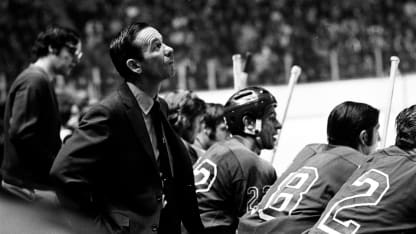
Normally, it would have been a snap for the teams to get to Madison Square Garden in time. But Francis was concerned because most of his players lived in Long Beach, a Long Island hockey compound near the Atlantic Ocean
Francis, who doubled as New York's coach, was aware that his players had two options for getting to the city -- by car via the Long Island Expressway or by train on the Long Island Rail Road from Long Beach to Penn Station, situated directly below the Garden.
But the snow was ferociously changing the equation, and by mid-afternoon Francis' Long Beach gang was in big trouble. The expressway had the look of a frozen tundra. Even snowmobiles would have had trouble navigating the highway.
The alternative was no bargain either, because the railroad was losing its battle with the snow. Manhattan-bound trains out of Long Beach might as well have been trying to cross the Rockies for all the progress that could be made over the rails trying to get to New York.
Alas, two of the Rangers' best players had mistakenly chosen the railroad as their route to the Garden. No. 1 goalie Ed Giacomin and first-line center Jean Ratelle, along with forward Larry Jeffrey, were worried but still hopeful when their train crossed the city line and slowly plowed through the snow-covered tracks in Queens.
But then the train hit a snowbank and stopped cold -- what else? -- in a neighborhood called Elmhurst, far from Manhattan. With no snowplows able to get through, Giacomin, Ratelle and Jeffrey were marooned.
In his book about the Rangers, "We Did Everything But Win," author George Grimm asserted that if Francis failed to ice a team, New York would have to forfeit the game. But there still was hope that nine other Rangers could reach the Garden.
Injured center Orland Kurtenbach had loaned his buddies a large station wagon that miraculously held nine players. These included two promising rookies, defenseman Brad Park and center Walt Tkaczuk, forwards Ron Stewart, Reg Fleming, Balon, and Vic Hadfield, as well as defensemen Rod Seiling and Jim Nielson.
Throwing caution to the wind, they jammed into the vehicle that perilously made its way toward Manhattan.
"We rode over dividers, through snow banks, everything," Balon said.
Every mile gained out of Long Beach was like a new melodrama, but they eventually reached the LIE, which was strewn with abandoned vehicles.
"Whenever we got stuck, Walter and I being the rookies, we had to get out and push," Park said. "Not only did we have to do that but sometimes there were cars that were stuck in front of us and we had to get out and get them out of the way in order to get by them."
By this time, Francis had learned that his No. 1 goalie, Giacomin, was stuck on a frozen train somewhere in Queens. Because NHL rules stipulated that a team could not play unless it had two goalies, Francis began contemplating the daunting fact that he might be resuming his goaltending career whether he liked it or not.
Fortunately, backup goalie Don Simmons was already at the Garden, having left Long Beach before the storm got too treacherous. But one goalie was not enough, and Francis was the only one available.
Because Francis had to get the green light from the League to don the pads, he phoned NHL President Clarence Campbell. "I told him that I was signing myself as the backup goaltender, and I meant it," Francis said. "If something had happened to Simmons I would have gone in there myself."
Campbell, who had remembered Francis wearing the pads for Chicago and the Rangers, went along with Francis' request. Then, with the perfect squelch, Campbell added, "Emile, be sure to sign yourself to a good contract."
Francis figured a $1 contract was ample for his limited services but it would amount to nothing if enough players failed to show up. And that meant the Flyers, who were nowhere to be found as well.
As for the snow-battling station wagon, it finally made its way down Seventh Avenue and up to the Garden entrance on 33rd Street with the posse of exhausted but deliriously happy players.
"It took us about three to four hours to get to the city," Park said, "but we had to get there because they didn't cancel games back then and they didn't postpone them."
But frustration mounted at the Garden because the Rangers needed an opponent and the Flyers were having blizzard challenges of their own. They were delayed by a frozen railroad switch.
The visitors were nowhere to be found when the scheduled starting time of 7:05 p.m. came around. They showed up an hour later with their equipment lagging another half hour behind them.
More than two hours after the game was supposed to start the puck finally dropped in an eerily near-empty arena. The blizzard had taken its toll on the usual sellout crowd; only 5,723 of the faithful were sprinkled through the 17,000-plus seats.
Those who did show up were treated to an exciting game. The Flyers led 3-0 midway through the third period before goals by Tkaczuk and Phil Goyette made it 3-2. Francis pulled Simmons in the final minute, replacing him with an extra forward, and the strategy paid off when Bob Nevin scored to give the Rangers a 3-3 tie [there was no overtime in those days].
While the final cheers for the comeback were echoing through the Garden, Giacomin, Ratelle and Jeffrey remained shivering in their stranded railroad car. They finally were rescued -- and thawed out -- the next morning.
Francis returned to his Garden desk the next morning, opened a drawer and slipped the $1 contract inside before closing a bizarre chapter in Rangers history. Eventually, he would have to pay a couple of hundred dollars more to Kurtenbach to replace the destroyed shocks and springs on the station wagon.
Looking back, Francis summed up the blizzard that battered his Blueshirts in five little words: "What a night that was."
Then, with a pause and a grin, "But at least we got a point out of it!"
